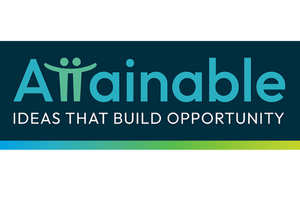Leading with Purpose: Five Reflections from My First Five Months as CEO

Five months after stepping into the CEO role at The Attainment Network, I’ve been reflecting on the lessons that have mattered most – not the ones I expected, but the ones I’ve experienced. Leading through uncertainty, shaping vision, and building trust require more than strategy. They demand presence, honesty, and the courage to stay grounded in who you are.
As CEO of an intermediary organization driving cross-sector systems change – connecting K–12 education, higher education, and workforce partners – my leadership must balance diverse perspectives, shifting priorities, and complex stakeholder dynamics across the education-to-workforce ecosystem.
These five lessons are shaping how I lead today. I offer them not as a formula, but as a reflection, in case you, too, are navigating change, building something new, or wondering if you’re doing it “right.”
Lesson 1: You Still Get to Be You – Whew!
I didn’t know exactly how my leadership style might need to change as CEO, but I expected the role would call for some significant adjustments. I imagined myself drawing harder lines, becoming more serious, focusing on tasks I didn’t necessarily enjoy, or stepping away from the work I love: the creative, connective parts of leading that have always energized me and my teams. I imagined I’d need to keep more distance to manage the pressure and pace.
But that image didn’t bring me joy or satisfaction. After some reflection, I chose a different approach. Instead of accepting a preconceived and superficial notion of leadership, I decided to be different – to invite more people in, leading authentically with humility and humor. I found that it softens the ground and opens up connections. One of my favorite ways of leaning into this approach has been to host a no-work-talk-allowed gathering at my house for women leaders across our education-to-workforce ecosystem (The Creative Crew), where we share our creative sides – hobbies, art, and passions – over wine. The first gathering was joyful and surprisingly deep.
In this role as the leader of an intermediary, I’ve learned that authentic connection is foundational to our success. It’s how we build trusted partnerships that span education and workforce systems, and it allows us to have an impact through influence rather than power.
On several occasions, I’ve reached out to others in the ecosystem with whom there have been perceived or real barriers to partnership in the past. I said: Let’s start again and see what we can do together. These have been some of the most valuable and productive conversations I’ve had. It doesn’t always reshape the relationship, but it sets a tone for what’s possible and signals the type of leader that I want to be – one who is brave enough to initiate a potentially uncomfortable conversation in the hope of shaping a stronger partnership. I don’t expect instant results from a single exchange, but I'll keep trying. I truly believe that if I leave the door open, I’ll build trust that will, over time, make progress possible.
Lesson 2: Titles Grant Access, but Trust Builds Influence
Having “CEO” in my title has undeniably changed how some people see me. My ideas are received differently, and my calendar fills more quickly. In our field, the title may open doors to funders and partners, but lasting influence depends on credibility, follow-through, and authentic relationships – especially when working across sectors with different goals, needs, and motivations.
If you don’t bring people along, nothing changes. I’ve learned to slow down, share more, and co-create the path forward with the people I want to move with. When we open up space for listening and collaboration, we build the trust that motivates people to show up and support the vision. I’ve seen this in action in our partnerships across the state. I try not to leave a meeting without asking, in some form, “What can I do for you?”
Lesson 3: Decision-Making Requires Clarity – and Flexibility
As I stepped into the role, very quickly we had to decide where to place our big bets in an uncertain ecosystem where anything could happen – or nothing at all. With input from the team, signals on the horizon, and a mix of educated guesses and calculated risks, we got clear on our strategic priorities. At the same time, we held onto a vision expansive enough to shift and pivot as new opportunities emerged.
But clarity alone wasn’t enough. Even after aligning around our direction, it requires ongoing collaboration, dialogue, and patience to bring it to life. Staying open to feedback, listening closely to our partners, and creating space for iteration is helping to ensure our decisions will lead to the impact we are seeking.
Lesson 4: You Can’t Skip the Inner Work
I’m unlearning manufactured urgency, self-doubt, and the belief that I always have to be “on.” Clear thinking and creative ideas need calm moments, reflection, and time to process out loud with others. I’ve stopped sitting back in rooms out of worry that my ideas aren’t polished enough, because my leadership and our work deserve a seat at the table.
That shift didn’t come from the strategic plan – it came from a somewhat uncomfortable self-awareness that it was necessary. Recently, I invited feedback from a longtime partner, even though I wasn’t sure I wanted to hear it. But I knew they were looking out for our best interests. If I hadn’t created space for that feedback in a moment of openness and reflective confidence, we would have missed an opportunity to move important work forward.
Lesson 5: Communication Is Culture
One of the smallest but most meaningful practices has been my weekly CEO updates to the team. These weekly emails help keep communication open, make space for feedback, and support shared ownership across the team.
The updates are just one of several ways I’m striving to live our values. I believe each action – whether it’s changing team members’ titles to better reflect their roles, inviting the whole team into fundraising conversations, and being transparent about our direction – reinforces a simple truth: culture isn’t just what we say, it’s what we practice.
I also now reserve time every Friday to process and follow up. I used to rush to respond in the small gaps between meetings during the week, but slowing down has made the work better. I’ve found that if something isn’t time-sensitive, it’s often more productive to let it breathe a bit before responding. I call it “percolating.”
Open communication is especially critical in our intermediary role, where shared ownership and transparency keep diverse teams aligned and engaged. These practices ensure I don’t miss opportunities that simply need space to surface – like program improvement ideas, new partnerships, and funding leads. And since we’re a fully remote team, this kind of intentional communication matters even more internally. I’m proud that our team is close-knit and well-coordinated, even though we’re spread across the state. We bring diversity of thought and experience to our work, and by keeping lines of communication open and transparent, we’re ready for the hard days and able to make the most of the good ones.
There’s still much I don’t know, and I’m really okay with that – maybe even grateful. These first five months have reminded me that leadership isn’t about conforming to a fixed idea of what a leader “should” be, following a strict playbook, or adopting someone else’s style. Instead, it’s about showing up authentically, inviting others in, and creating the conditions for people and partnerships to thrive in the space I’m shaping.
Making the internal transition from COO to CEO has given me a unique perspective on continuity and growth – on honoring what’s been built while steering toward what’s next. Leadership, I’m learning, is something I define for myself every day by meeting the moment. It’s a process, a practice, and a path of becoming more fully who I am. And I’m grateful for every step of the journey.
RECENT ARTICLES



